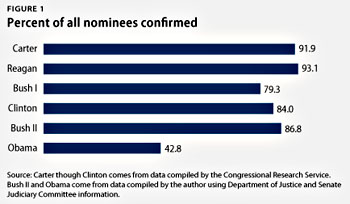 As a quick followup to my filibuster post this morning, here’s a Center for American Progress chart on Republican use of holds against judicial nominees. Nickel summary: it’s way up:
As a quick followup to my filibuster post this morning, here’s a Center for American Progress chart on Republican use of holds against judicial nominees. Nickel summary: it’s way up:
Judicial confirmations slowed to a trickle on the day President Barack Obama took office. Filibusters, anonymous holds, and other obstructionary tactics have become the rule. Uncontroversial nominees wait months for a floor vote, and even district court nominees—low-ranking judges whose confirmations have never been controversial in the past—are routinely filibustered into oblivion. Nominations grind to a halt in many cases even after the Senate Judiciary Committee has unanimously endorsed a nominee.
….There is a simple explanation for the sudden drop-off in confirmation rates—obstructionists in the Senate are using filibusters and holds at an unprecedented rate. And it is nearly impossible to break the filibusters and holds on Obama’s nominees.
For all practical purposes, holds and filibusters are the same thing. The Senate runs on unanimous consent, which means that a single person can bring things to a halt if he or she wants to. A filibuster in the modern era is basically just a threat to withhold unanimous consent if the majority attempts to hold a vote, and the same is true of a hold. They’re two sides of the same coin.
Obama has come under a lot of criticism from the left for his slow pace in nominating judges. And he deserves it. But honestly, how much does it matter given the obstructionism from Republicans that’s now become routine? As the CAP report says, even district court judges are being held up at unprecedented rates, even though they’ve enjoyed 90% confirmation rates pretty steadily all the way through the last administration. But today’s Republicans haven’t even allowed votes on half of Obama’s nominees. If there’s any aspect of the Senate rules that seems ripe for reform, this is it. But even this, I’d guess, has a pretty slim chance of getting it.








